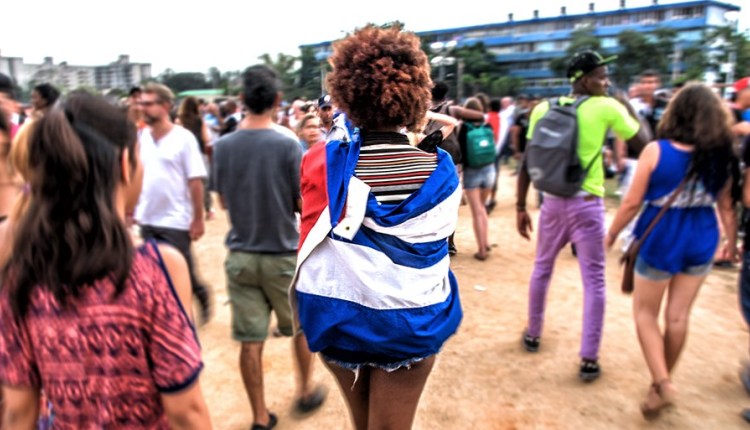Cuba: activists demand an adequate response to the “silent pandemic” of gender-based violence
Washington, D.C., April 12, 2021.- On International Women’s Day 2021 (March 8th), the Cuban government published Presidential Decree 198/2021, which inaugurated the National Program for the Advancement of Women (known […]

Washington, D.C., April 12, 2021.- On International Women’s Day 2021 (March 8th), the Cuban government published Presidential Decree 198/2021, which inaugurated the National Program for the Advancement of Women (known by its Spanish initials, PAM). According to the decree, the PAM “forms the cornerstone in the development of pro-women policies, while furthering the advancement and development of gender equality in Cuba and the institutionalization of this right.”
The decree comes as Cuban activists and civil organizations demand a law against gender-based violence in response to alarming levels of violence against women and girls on the island. So far in 2021, civil society organizations have documented 10 murders of women; civil society counted 32 women, including two girls, murdered in 2020.
Cuban women’s demands
On November 21, 2019, 40 women representing independent civil society submitted a petition to Cuba’s National Assembly requesting a law against gender-based violence, highlighting the following key points, among others:
- Article 43 of Cuba’s new constitution (approved in 2019) requires the State to create institutional and legal mechanisms to protect women from gender-based violence.
- The 2016 National Survey on Gender Equality found that partner violence is an issue for women across the country and that the majority of survivors do not seek justice or assistance from State institutions.
- Cuba’s own National Report on the Implementation of the 2030 Agenda (presented in 2019) officially recognized ‘femicides’ as an official category of documentation and analysis.
The National Assembly, however, sent a response to the presenters of the petition on January 10, 2020, informing them that a law against gender-based violence would not be included on the next legislative calendar, which includes all potential bills and laws until 2028.
A campaign for equality
Despite the Assembly’s refusal to consider the matter, activism to fight gender-based violence is vibrant throughout Cuba. Several organizations have pushed the issue forward through Twitter, Facebook, and other online channels. The increasing availability of internet and mobile data in Cuba has allowed these women and other Cuban activists to fight for their rights. Denunciations of sexist violence grow more and more visible, as do activists’ demands.
Cuban civil society organizations emphasize that in the Americas, only Cuba and Haiti lack laws criminalizing femicide. On International Women’s Day 2021, as the government published the decree creating the PAM, women’s organizations published their own manifesto, entitled “Gender-based Violence: The Silent Pandemic,” which documents the various forms of violence facing Cuban women on a daily basis.
“Understanding violence as a personal issue facing individuals puts women into a situation of subordination to men and takes for granted historically unequal power relations between men and women, legitimating the maintenance of men’s domination over women,” the manifesto reads. “This prevents women from denouncing the violence they face due to feelings of fear, shame, or guilt.”
The need for a comprehensive law
Gender-based violence is rooted in the gender inequalities facing women and people with feminine gender identities. These inequalities are imbedded in cultural and social structures, relegating all those who do not fit a male and heterosexual ideal to second-class status. Direct, symbolic, and structural violence are all inflicted upon women, manifesting as physical, verbal, and psychological attacks along with denial of opportunities. Sexism and misogyny also manifest in violence committed against women for reasons of gender, presenting a specific and differentiated threat of femicide.
The Cuban government must act swiftly to approve a comprehensive law addressing gender-based violence. Having signed and ratified the International Convention on the Elimination of all forms of Discrimination against Women (CEDAW), Cuba is bound to advance legislation promoting gender equality. A law that criminalizes gender-based violence and promotes women’s enjoyment of their rights is a necessary step towards fulfilling Cuba’s commitment under the Convention.
Various international mechanisms have already recommended the passage of such a law. The UN Committee on the Elimination of all forms of Discrimination against Women, which oversees the implementation of the Convention, expressed concern at the levels of violence against women in Cuba and recommended a law outlawing gender-based violence, acknowledging that gender-based violence against women represents a serious form of discrimination in society.
The Inter-American Commission on Human Rights (IACHR) also recommended the creation of a legal framework to address women’s rights violations in its last country report on Cuba, including legal standards on discrimination against women. The IACHR also called on Cuba to sign and ratify the Inter-American Convention to Prevent, Sanction, and Eliminate Violence Against Women, known as the Convention of Belem do Para.
Race and Equality urges Cuba to use the creation of the National Program for the Advancement of Women (PAM) as a first step towards the creation of a comprehensive law on gender-based violence. Full implementation of the PAM should include the creation of trustworthy, disaggregated statistics so that Cuban policy can respond to women’s diverse and intersectional needs. With both the COVID-19 pandemic and the ‘silent pandemic’ of violence against women raging across Cuba, such policies will save many women’s lives.
Cuba must also formally recognize and criminalize all forms of violence against women. The end of impunity for these violations is a critical step to advancing women’s well-being. The tireless work of activists in Cuba has made violence against women a pressing issue at the national and international level. Race and Equality is proud to join this campaign and call for the passage of the proposed Comprehensive Law Against Gender-Based Violence.

